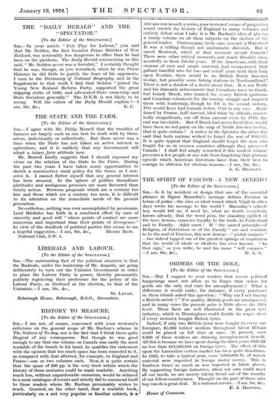HISTORY TO MEASURE.
[To the Editor of the SPECTATOR.] SIR,—I am not, of course, concerned with your reviewer's criticisms on the general scope of Mr. Buchan's scheme in The Nations of To-day, nor is the fact that I think them quite illogical of any consequence. But though he was good enough to say that one volume on Canada was easily the most readable of the bunch in his hand, he qualifies the statement with the opinion that too much space has been conceded to it, as compared with that allotted, for example, to England and France—one or two volumes each. Now, it is quite certain that the space of 200 pp. is the very limit within which the history of three centuries could be made readable. Anything much less, without unpardonable omissions, would be reduced to a mere catalogue of events and utterly fail to commend itself to those readers whom Mr. Buchan presumably wishes to reach Granted, on the other hand, that a readable book, particularly on a not very popular or familiar subject, Is a sine qua non in such a series, your reviewer's sense of proportion would stretch the history of England to many volumes and entirely defeat what I take it is Mr. Buchan's idea of placing a handy volume on all these subjects on the shelves of the general reader. Chateauguay, to be sure, was not a Waterloo ! It was a trifling though not undramatic skirmish. But it saved Montreal, which at that moment meant Canada ! There were other critical moments, and much bloodier ones, assuredly in those fateful years. If the Americans, with their swarms of men and ample material, had overpowered that gallant handful who for two and a-half years held their long open frontier, there would be no British North America to-day, but possibly some fishing stations in Newfoundland ! There is not a shadow of a doubt about that. It is not Wolfe and his dramatic achievement that Canadians have to thank, but Isaack Brock, who trained the scanty British garrisons and Canadian volunteers for the coming struggle and inspired them with leadership, though he fell in his second victory. Pitt would have had Canada before 1763 in any case. Aban- doned by France, half starved, bled white by officials, numer- ically insignificant, cut off from succour even by 1759, the end was inevitable. But if Brock had never lived there would have been no red paint on the map of North America to-day, that is quite certain ! A writer in the Spectator the other day said that both nations wished to forget the war of 1812-14. It is quite typical that England should forget the men who fought for us in oversea countries although they preserved Canada ! I shall feel amply rewarded if this modest volume prevents a few people at any rate from forgetting that glorious episode which American historians have done their best to consign to oblivion for obvious reasons.—I am, Sir, &c., A. G. BRADLEY.










































 Previous page
Previous page